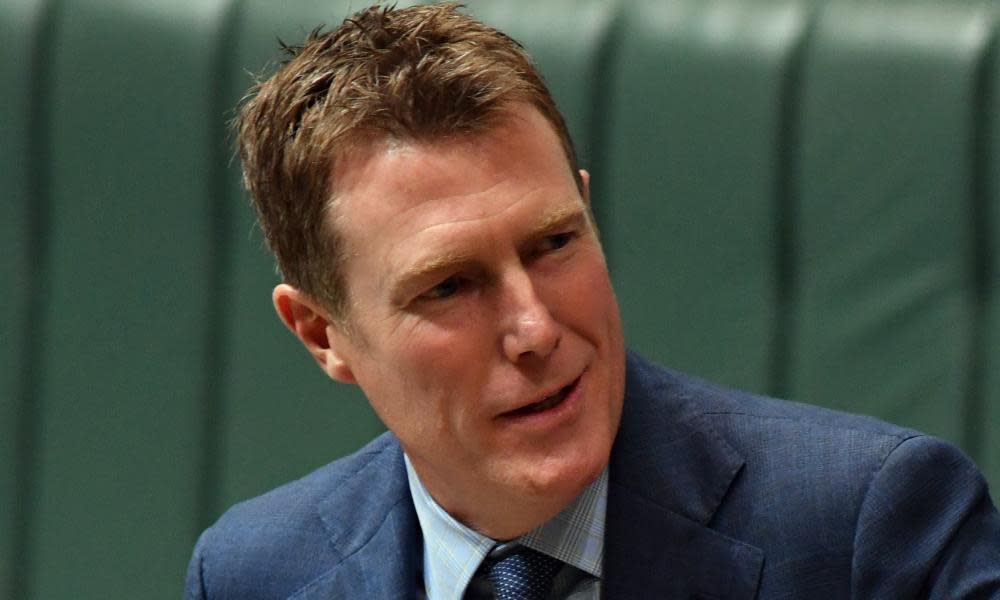Industrial reforms at risk as talks between unions and employer groups break down

Direct negotiations between Australian unions and employer groups have broken down, dimming hopes that a package of industrial relations reforms could be agreed by consensus.
In a statement on Thursday, the Australian Council of Trade Unions secretary Sally McManus blasted some employer groups who she said had failed to respect the secrecy of talks and had pursued cuts to workers’ pay and conditions.
The five industrial relations working groups will now enter a new phase of bilateral meetings with the Morrison government, leaving the industrial relations minister, Christian Porter, to pick and choose preferred ideas for a reform package without agreement of all parties.
Related: Wage underpayment: inquiry urges payroll solution to industrial relations 'complexity'
The development comes as Liberal backbenchers press the treasurer, Josh Frydenberg, to pursue labour market deregulation as one of a suite of reforms to boost jobs creation during the Covid-19 recession.
In May, Scott Morrison ditched the Coalition’s union-busting legislation in a sign of good faith before talks to tackle simplification of pay and conditions, compliance, regulation of casuals’ labour, workplace pay deals and deals for new work sites.
As the talks’ September deadline approached, employer groups fell out over a deal struck between unions and big business to prioritise union agreements in Australia’s workplace system.
On Thursday, McManus said unions would still keep talks secret until they finish but she took aim at “a number of employer lobby groups [that] no longer wish to respect the confidentiality agreement or engage with this process in good faith”.
“It is apparent that some entered this process not wanting to reach common ground and advance the national interest, but simply to use the opportunity to undermine working people’s rights at a time of unprecedented national crisis,” she said.
“We remain hopeful that an agreement can be reached which will benefit working people and the national interest.”
“We continue to believe that agreements can be reached that benefit working people as well as business, and urge the various employer groupings to put the national interest first.”
Denita Wawn, the chief executive of Master Builders Australia, told Guardian Australia she had gone public to defend her position after “consistent leaks” from the group dealing with workplace pay deals named her as one of the employer leaders unhappy with the union big business deal.
Although MBA had compromised to pursue talks “we couldn’t let go of some fundamental policy positions and freedom of association is one of them”, she said, explaining her opposition to giving union agreements a fast-track to approval.
Council of Small Business Organisations of Australia (Cosboa) chief executive, Peter Strong, also shot back at unions, saying their proposals show they “don’t know how jobs are created”.
In the group dealing with simplification of industrial awards, Cosboa proposed a series of 24 schedules allowing small businesses greater workforce flexibility.
The schedules would allow businesses with fewer than 40 employees to pay a single weekday and weekend pay rate incorporating all penalties and for part-time workers to pick up shifts without being paid overtime rates. Strong told Guardian Australia the proposal was “still in the mix”.
In the casuals’ group, agreement was almost reached on a proposal to allow casual workers the ability to convert to permanent employment after nine months.
The compliance group failed to reach agreement after unions sought higher penalties for underpayment of workers including criminal penalties.
The group discussing pay deals for new sites could not agree on the size of project to qualify for an agreement to last the length of the project, protecting employers from possible strikes and costly renegotiations mid-project.
On Wednesday, Porter conceded that while unions and employers agreed on the problems there was “imperfect agreement around solutions”.
In comments to 6PR Radio, Porter appeared to side with small-business employers on overtime pay, explaining that a part-time worker might not be able to pick up extra hours because “they’d have to be paid a very significant overtime amount”. He said such an outcome was “bad for jobs and job growth”.
Porter said in industries that have been hardest hit by Covid-19 such as retail, restaurants and hospitality, employees are paid according to seven or eight different classifications, causing “complication” for businesses.
Related: As conspiracists cry freedom, Australian 'lefties' back riot police | Jeff Sparrow
In August Guardian Australia reported that in addition to supporting a special award for small business, the small and family business ombudsman Kate Carnell revealed the working groups were considering using payroll software to improve compliance with pay laws.
Under the plan, employers who use approved payroll software could be provided “safe harbour” against prosecution and penalties for wage underpayment.
Strong blamed unions for the breakdown in talks on compliance, saying they had refused to accept the system for calculating pay was complicated.
But he said a “reg-tech” (regulation technology) solution such as improved payroll software was viewed positively after initial scepticism from unions.
Wawn said the process of negotiations – the most extensive since the consultations before legislation of the Fair Work Act in 2008 and 2009 – at least leaves the minister “well informed” about employers’ and unions’ positions.
Strong said the talks were “still a positive process”. “We should be talking – and we were.”

 Yahoo News
Yahoo News 
